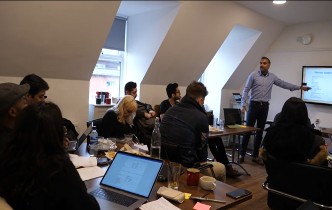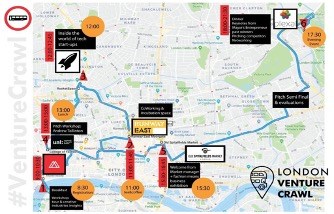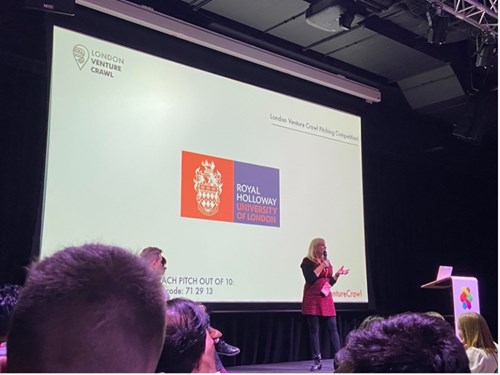Group Size
?
1.) Small group (teams of 4-6)
2.) Individual Task
3.) Large Group
4.) Any
Large Group
Learning Environment
?
1.) Lecture Theatre
2.) Presentation Space
3.) Carousel Tables (small working group)
4.) Any
5.) Outside
6.) Special
Any
QAA Enterprise Theme(s)
?
1.) Creativity and Innovation
2.) Opportunity recognition, creation and evaluation
3.) Decision making supported by critical analysis and judgement
4.) Implementation of ideas through leadership and management
5.) Reflection and Action
6.) Interpersonal Skills
7.) Communication and Strategy
1Creativity and Innovation
2Opportunity recognition‚ creation and evaluation
3Decision making supported by critical analysis and judgement
7Communication and Strategy
This case study describes two events conducted by me as the Co-Director of the Enterprise Hub at Royal Holloway, University of London. The aim of the Enterprise Hub and these events is to support students interested in starting their entrepreneurial ventures by providing them guidance and advice on the practical aspects related to entrepreneurship. The first event, a two-day bootcamp was conducted to help students brainstorm their ideas and refine them following discussions with fellow peers. This was followed by a ‘Venture crawl’ that took students around the city, to experience the London start-up scene and pitch their ideas to large audience and gain first-hand experience of being a start-up entrepreneur.
I strongly believe that learning that takes place in the classrooms of universities and schools is only the first step that lays down the foundation to ensure effective learning throughout the entire life of an individual. Based on this belief, I try to ensure that I support my students in their learning outside the confines of a traditional classroom and make them capable enough to be able to learn from everyday activities.
To this end, one of the initiatives that I have been involved in developing is the Enterprise Hub at RHUL. The Enterprise Hub is a co-curricular learning centre open to all RHUL students. The aim is to be able to allow students to apply their learnings to the real world in a practical manner. In addition to the academic concepts around entrepreneurship that I teach the students, this initiative allows me to equip students with the practical skillset with which they can leverage their academic knowledge and convert it into actions.
As a part of this, there are two events that encapsulate the essence of this practical learning initiative for me. The first event was an ‘Enterprise Innovation Day’ where I provided students with a practical guide on how to convert their ideas into viable business opportunities.
In this two-day Entrepreneurship Bootcamp, I provided students with the opportunity to discuss their ideas in front of their peers and colleagues. They were then provided with worksheets to help them apply some important entrepreneurship concepts and theories to further develop their ideas.
This included activities around the following key themes of entrepreneurship:
The students worked in their respective start-up teams to brainstorm on these topics and try to consider their business/start-up idea from a broader perspective, with a greater importance given to thinking like the customer.
This workshop gave students detailed insights into the real knowledge and skills required to start and run a business. However, more importantly it gave me insight into how the students want to learn and what is the best method to increase learning within traditional classrooms as well. I incorporated the use of some of the worksheets and activities from this session into my course on New Venture Creation in the following term.
Following the completion of the bootcamp, the second event that I organized as a part of the Enterprise Hub was a ‘Venture Crawl’. In this event, students were taken on a field trip through London and visited some of the best Incubators and Co-working spaces that are at the centre of London’s start-up culture. Students were given the opportunity to pitch their business ideas in front of a large crowd of spectators, they interacted with start-up entrepreneurs and got the opportunity to experience, first-hand, what it means to be an entrepreneur.
I believe this form of blended learning is the future of education. The interactions that I have had with students outside the bounds of the classroom, have shaped the way I teach within classrooms. It is evident to me that providing them with research papers and reading material from textbooks is no longer sufficient and must be guided through interaction with practitioners and by learning to fail through practical experimentation. Some pedagogic literature has recognised that for young entrepreneurs the inability to deal with failure is a major drawback – hence through practical events such as pitching ideas in front of others and self-reflection, I have been able to incorporate the importance of ‘Learning to fail’ in my classroom teaching as well.
Another observation that further strengthened my belief in this method, was that following these events, I noticed a significantly different approach from the students within the classroom. There was an increase in interactions, discussion and debates during lectures – leading to deep and conscious learning.
Student feedback
“I felt that the ways in which we had to create our own venture idea, taught us a lot. It also gave us a real insight on establishing a company nowadays and the steps involved to reach a well designed idea. As discussed with my team members and I, this course has made us gain great information and an experience on establishing our new venture, which we loved creating.” (Innovation Festival 2020)
“I learnt that there were a lot of mature students looking at becoming entrepreneurs and that we are not on the scrap heap - far from it” and “Visiting the various incubators was fascinating and very rewarding. I had no idea there was so much help, support and community available to start-ups”, “pitching in front of a large audience was great” (Venture Crawl)
“I learn a completely new thing about design thinking process. I also learn that working in a team is much, much better than working individually.” (practitioner workshop)
“Pushing us to pitch in front of a group was really helpful”, “Connecting with other entrepreneurs within the university was the best point for me” (Innovation Festival 2020)


